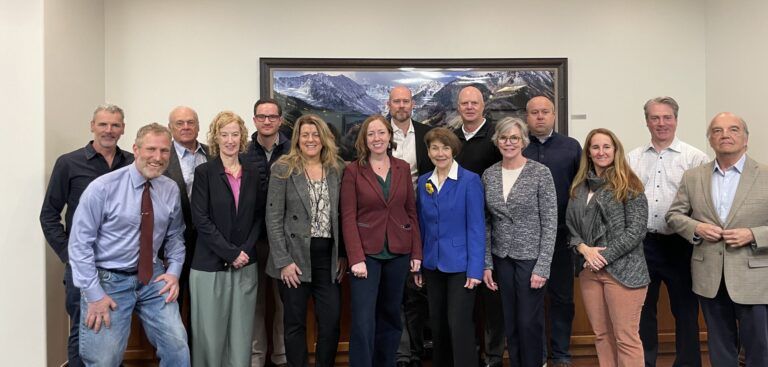Remote workers still impacting area economy, CEOs say
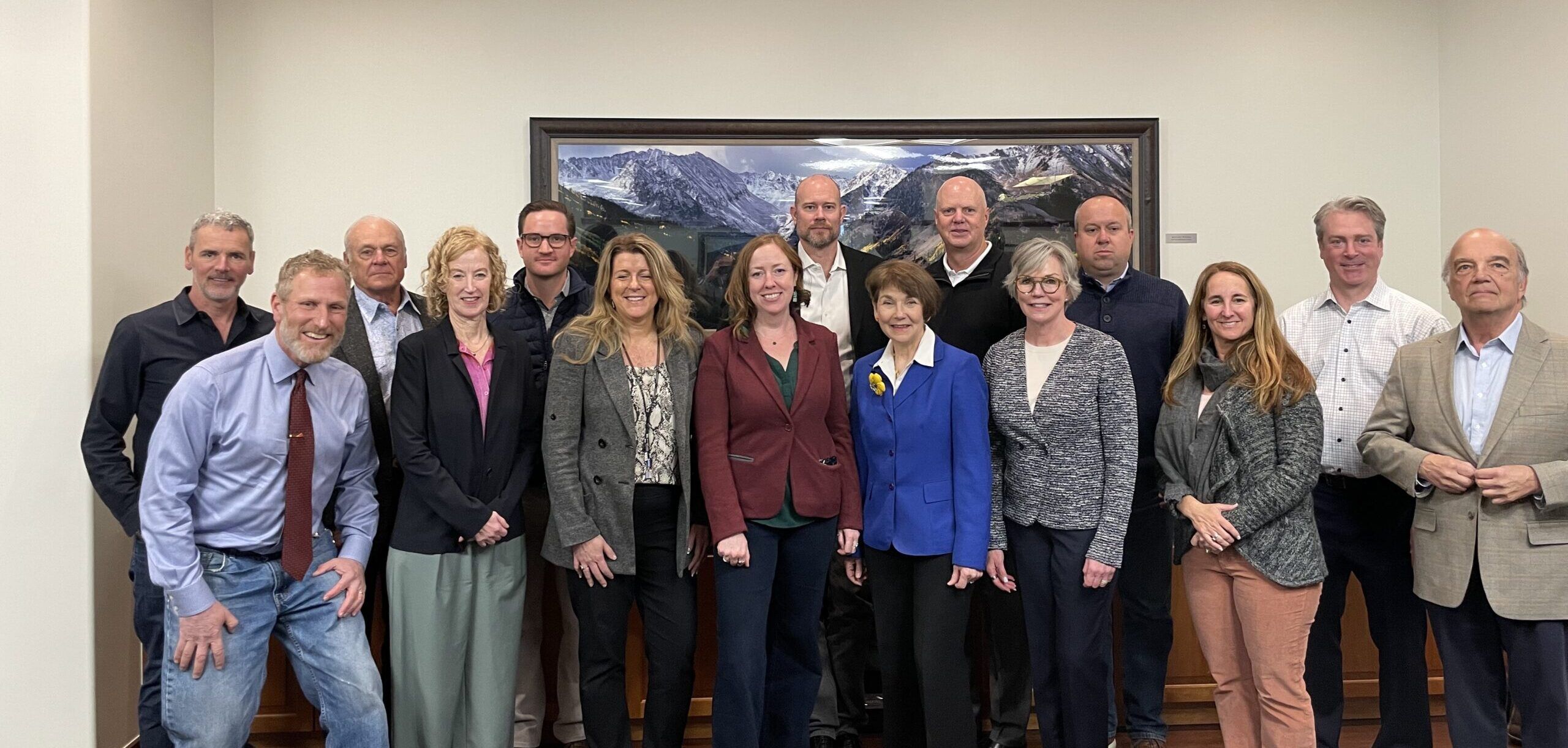
BOULDER — Whether people will come back to the workplace in the wake of the COVID-19 pandemic or prefer to keep working remotely continues to present challenges that ripple through the economy, local business leaders said Tuesday during the BizWest CEO Roundtable on the Boulder Valley economy, held at the Boulder offices of Berg Hill Greenleaf Ruscitti LLP.
“The commercial office occupancy rate is at an incredibly low level, less than 50% in many of the major markets,” said Rich Wobbekind, senior economist and faculty director of the Business Research Division at the University of Colorado Boulder’s Leeds School of Business. “There’s lots of space available, and that’s a big area of concern for us.”
Beau Gamble, president of Dean Callan & Co., acknowledged that at this time last year, “I and the rest of the commercial real-estate world were probably very doom and gloom as far as office space goes, and if anything, we were going to get more vacancies.” The reason, he said, is that before the pandemic, companies signed five- and seven-year leases, so that even when the COVID restrictions hit and office buildings looked vacant, landlords were still receiving income.
SPONSORED CONTENT
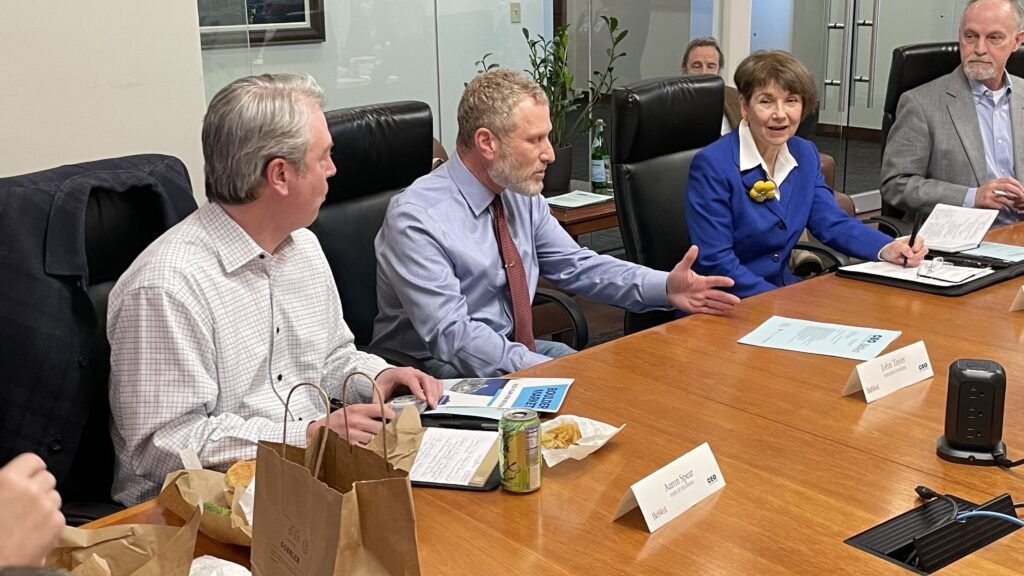
“But now we’re seeing the transition where, for these 10,000- to 40,000-square-foot tenants, those leases have started to end,” he said. “This time, they’re circling around and probably looking for 50% of their space, or sometimes even 20% of what they previously had. So while it is good that I’m starting to see more activity in the office market, and people wanting to go back to work, the negative and the downside of it is that these companies that did have 30,000 or 50,000 square feet in an office building and 40 to 50 employees coming to work every day, they’re downsizing because only 15 people or 30 people are coming to work every day.
“It’s good to see that companies do want to sign office leases and get a home base and not have everyone remote and working from home,” Gamble said, “but on the flip side, it’s typically a large downsize.”
Several executives at the roundtable cited wellness, convenience and quality of life as factors that are keeping employees home, and Theresa Szczurek, CEO of Technology and Management Solutions, noted that a recent Wall Street Journal survey found that 80% of people would leave their jobs if they could but can’t.
“There’s a mismatch right now,” said Peggy Shell, CEO and founder of recruiting firm Creative Alignments. “Companies want their people back in the office. Commercial brokers want their people back in the office. Retail wants people back. But people don’t want to go back to the office.
“They’re OK with a hybrid,” she said. “Some studies say hybrid is preferred over remote only, but that’s not our experience. The people we’re talking with would prefer remote only over being in an office. It is expanding talent pools for our clients to be able to hire from wherever, and they’re taking advantage of that, but remote is what people want.”
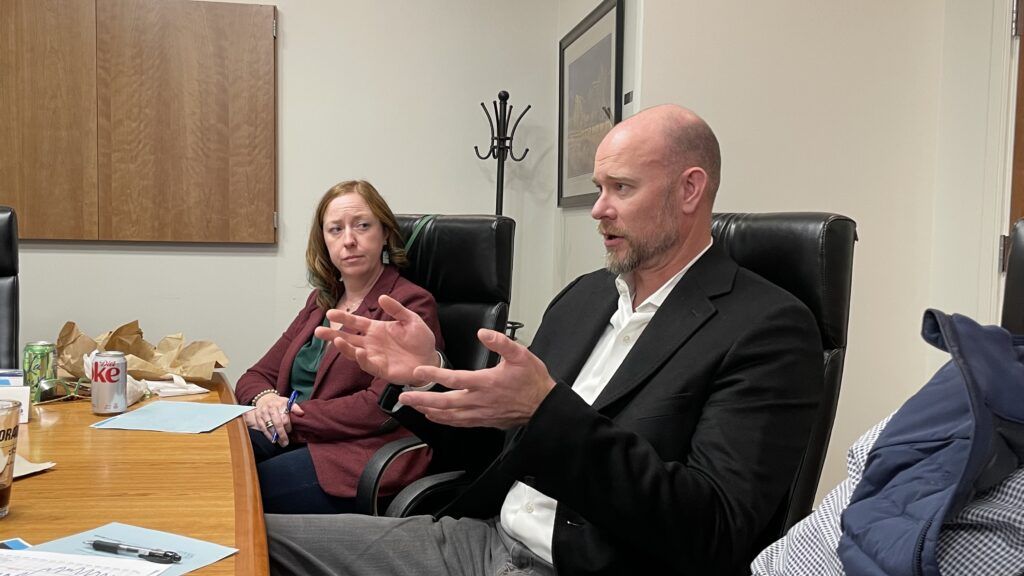
Those workers might find, however, that working from home is hindering their chances for advancement, Gamble said.
“I do think people are going to come back to work,” he said, because, “if you pay attention nationally and to larger companies, one of the things a lot of CEOs and companies are stating is that if you want to move up in this company, they’re starting to look at how often you come into the office. Are you there four days a week? Are you there five days a week? Do you even live where our company is? Are you living in another state and working remotely? So people who want to advance their careers, they’re getting favored because they do come into the office every day for work.”
Szczurek agreed.
“There’s been some recent studies that show that exact thing, that people who do come in are getting promotions and getting better jobs,” she said, “so hopefully that will make an impact.”
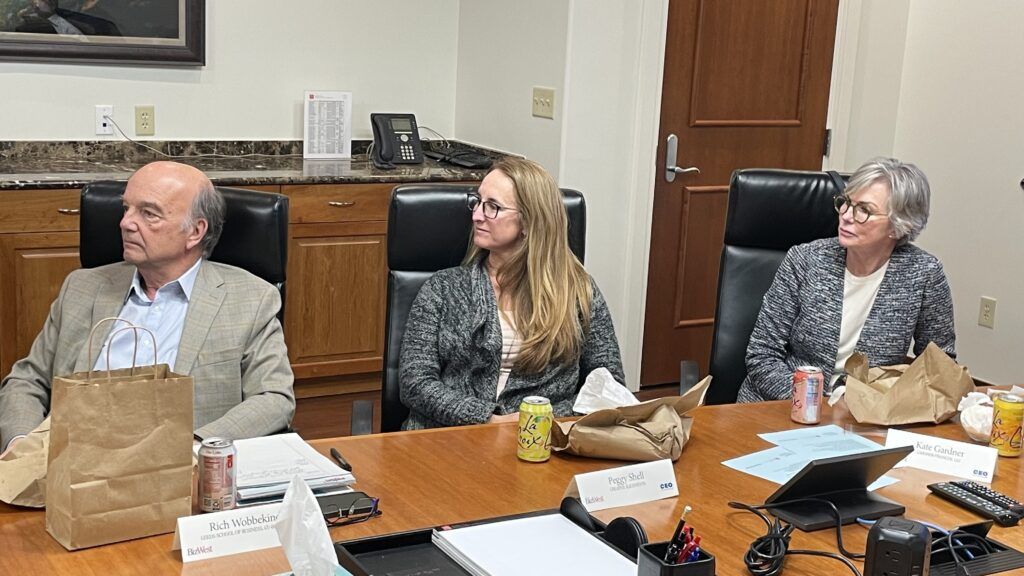
Others pointed out the challenges working remotely present for receiving mentorship and working collaboratively.
“The pull to come back to the office is really strong on the executive level,” said John Tayer, president and CEO of the Boulder Chamber. “They recognize that actual productivity is significantly lower, and employees are not getting the mentoring they need or have the ability to share work.”
“We want everyone to come back to the office. It would be great. It’s good for everybody,” Gamble said. “There are a lot of retailers that rely on those businesses and those people going to work. I’m optimistic that people will start heading back to the office, but it’s not going to be as fast as everybody wants.”
Although one study indicates that Boulder workers “are returning to the office at a little quicker pace than they are nationally,” Bettina Swigger, CEO of the Downtown Boulder Partnership, said the restaurant industry is still feeling the pinch.
“It’s going to be interesting to see if some of the restaurants stay open for lunch at the rate that they’ve been able to,” she said, especially “if it takes 40 people to run a 100-seat restaurant and you don’t have enough customers to come in for lunch.”
The answer, she said, is that “we have to be creative, and with the startup, entrepreneurial culture of this area, I think we can come up with some really cool ideas that can be emulated across the state and even across the nation.”
One of those ideas, Gamble said, is that “what some landlords have done is come up with a super high-end office product, and that attracts the users who are not startups back to the office space, the leased space, because ultimately they want their employees to come to work. How do you get your employees to come to work? You lease the most bad-ass office space possible with all the amenities.”
On the other end, he said, “you have all these folks who are trying to get rid of their office space, whether it be subleased space or landlords who have sat on vacancies.” He said a startup coming out of the University of Colorado Boulder “probably can’t go lease Class A office space downtown. But today there’s probably an opportunity for them to backfill something where some landlord can get aggressive enough to let them in.
“Boulder’s a great place for startups, and they’re still going to need space as they grow,” he said. “What two or three people were during the pandemic, now they’ve got some funding and now they’re 10 to 15 people. At least that’s how we’re starting to backfill out of the smaller offices.”
Other sectors avoided massive vacancy and worker absence, Gamble said.
“Industrial flex space, that’s a COVID-proof product,” he said. “Companies and users need those spaces, need to physically go into work, need to physically work on their robotics or their engineering or whatever it may be. A plumber needs to have a warehouse industrial space for all his products. Construction companies need to have warehouse space. Where you’re seeing the larger spaces come online, that heavily has to do with distribution, and we need large distribution as Amazon continues to take over the world and everybody needs everything delivered to them. So we need more shipping, receiving and distribution.”
At least in some areas, retail also has weathered the storm, he said. Although some vacancies remain, Gamble said, “if you walk Pearl Street, you’ll notice that pretty much everything is full and happening. And if it’s not full, they’re probably negotiating a deal with somebody and the activity is strong. Pearl Street Mall is always going to be a happening place.”
Added Wobbekind, “The consumer continues to amaze all of us.”
Part of the retail resilience in Boulder is from tourism and convention business, said Charlene Hoffman, CEO of Visit Boulder. Noting that airline, hotel and short-term rental businesses have all seen increases, she said “we are benefitting from the revenge travel mindset. Yes, gas is up, inflation is up, interest rates are up — but people say, eh, that doesn’t matter, we’re going to go on a trip and use some entertainment. Our industry is still second highest in revenue in Colorado.
“Considering that we were hit the hardest during the pandemic and we really suffered, our industry is really powerful and we’re excited,” she said. “Average daily rates have gone up 22% since 2019. I don’t know that we’ll continue to see that double-digit growth,” but additions such as the Moxy-branded hotel by Marriott and the Limelight Hotel Boulder should help.
Also helping has been what she called the “Prime effect,” referring to the energy and attention Deion “Coach Prime” Sanders brought to the CU football program and the city as a whole.
“There’s a lot of attention on Boulder, and that’s something that we take for granted sometimes,” agreed Todd Gullette, managing broker at Re/Max of Boulder. “We’ve hit the map in a lot of areas we may not have otherwise. It should only strengthen our marketplace.”
This year, Gullette said, “a lot of the factors that affect real estate locally are proving to be good. We’re starting out this year a little bit stronger.”
Much depends on interest rates and what the Federal Reserve does about them, said Gullette and Aaron Spear, Boulder market president for Bank of Colorado.
“Our society can get used to a 2% increase in interest rates over time, but if you do more than 2% in a short period of time, it becomes an affordability issue and we kind of throw up our hands,” Gullette said. “That’s exactly what we did in 2022, and that lingered through 2023. Now I think interest rates have at least calmed. We’re getting stability from that message, but we’ve also had time to get used to it.
“One of the historic issues we have when we have high interest rates is that our sellers don’t know where they would move,” he said. “They’re holding onto really low-interest mortgages on their homes. The prospect of moving across town to a home that maybe suits their situation better is that they have to struggle with the loss of an amazing mortgage.
“We had a lot of cash buyers at the high end that weren’t affected by interest rates,” he said. “The lower-end product did very well because people had a physiological need for shelter.
“The economy here and employers here are extremely strong,” Gullette said. “Some of this pent-up demand for homes is going to be very real in Boulder. I think that we’re going to be in an appreciating market this year.”
Still, said Spear, “those higher interest rates make it harder for the consumer to go out and afford any new vehicle they feel they need. So if we see a reduction in interest rates from the Fed that drives the costs down, there is a lot of pent-up demand, whether that’s new cars, homes or commercial real-estate projects. A lot could break free if we get action from the Fed, and we could return to a more normal interest-rate environment. If we get to 5%, I guarantee there would be a ton of economic activity, inflation possibly in check, and the employment picture relatively stable. Then I think there’s a lot of reasons for optimism.”
Higher expenses are still driving a lot of business decisions, said Kate Gardner, principal at Gardner Financial LLC, especially in the areas of transportation, workers compensation, general liability and insurance premiums.
It makes a difference, she said, “when a company has $5 million in revenue but a $500,000 insurance premium.”
Even the outdoor-recreation industry is feeling the pinch from climate and wildfire concerns “as well as inflated expenses in general.
“They’re all dealing with it, but they’re being cautious,” Gardner said.
“I hear about the trends. I hear about the interest rate issues,” Tayer said. “But Boulder fundamentally is resilient, and it’s resilient for so many reasons. With the caliber of talent we are able to attract even in a tight labor market, it’s still a desirable place to attract a quality workforce.
“Yes, on the lower echelon of the income scale, we have trouble attracting that level of talent, so that’s something we as a community have to continue to invest in. But I’m so bullish on this community. We have the opportunity for collaboration to address our housing and homeless issues. We have a community whose foundation is on innovation and technology.
“Boulder is a place that attracts creativity, attracts new, enterprising activities,” Tayer said. “Yes, there will be these national trends, and we have to be cognizant of things like interest rates and what that might do to investments, but I really am bullish that ultimately we will sustain that resilience that is unique to Boulder. I continue to see that there are folks who come to this town because they know that it’s alive with the technology and the support network for entrepreneurs.”
The CEO Roundtable also was attended by sponsors Jeremy Wilson and Jim Cowgill of Plante Moran, and George Berg and Kathleen Alt of Berg Hill Greenleaf Ruscitti LLP. Bank of Colorado also is a sponsor.
Editor’s note: This article has been corrected to reflect that average daily rates for hotels have increased 22%, not hotel stays.

